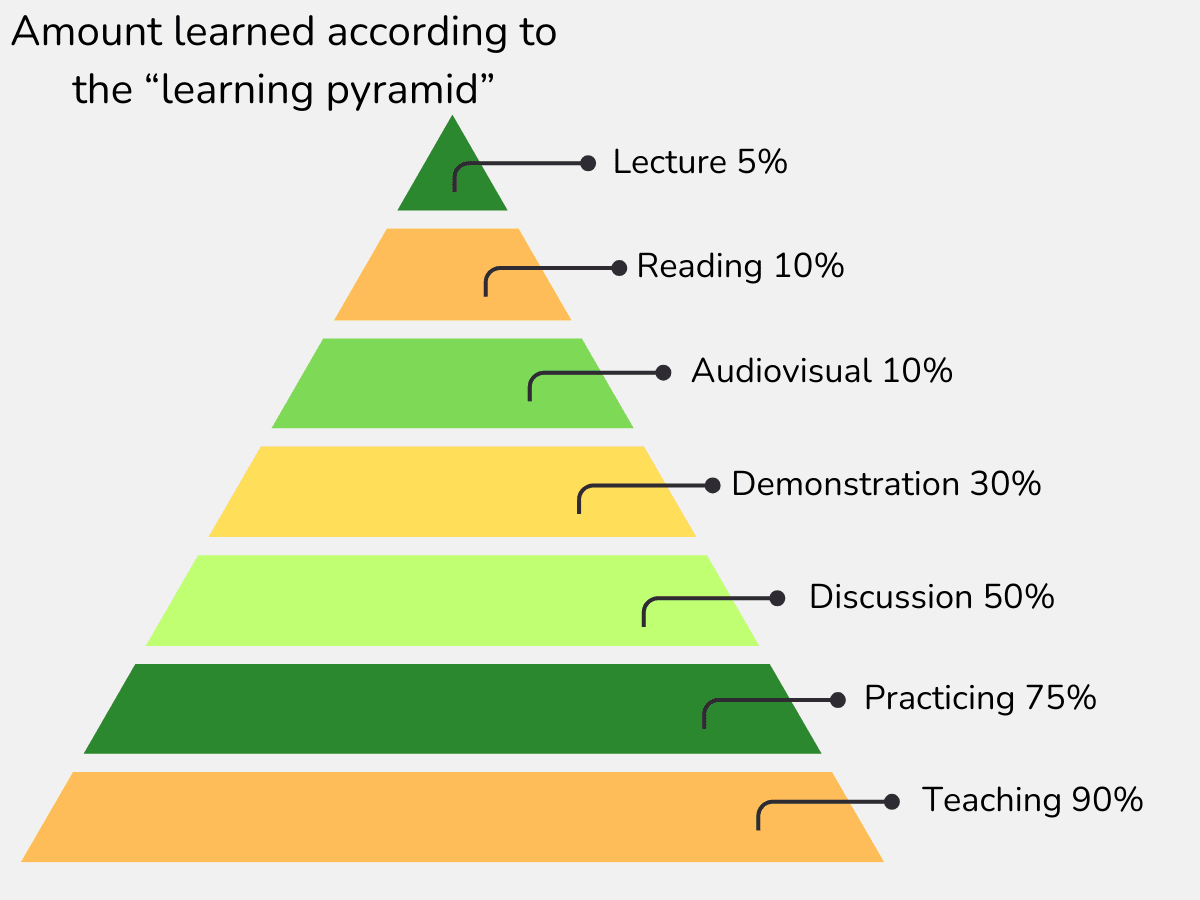
There is a huge amount of information on learning and studying, as there is on any subject these days. The search engine and AI continue producing results, and content providers never run out of ideas and ways to recycle old content. One of the annoying things about the internet is that incorrect information and harmful trends can live an unnecessarily long life or even take over public opinion.
There are also many persistent myths about learning, which learning research has long since shown to be incorrect or at least misleading. However, they are still alive and well and have a strong influence even on the thinking of teachers and instructional designers, not to mention students seeking information to improve their learning.
Source criticism is one of the most important skills to master when searching for information online. It is always worth checking whether the same information can be found elsewhere, and by whom it has been published. For example, one million followers do not automatically make an influencer a professional in their field.
Myths and misleading information often have common features:
- The argument simplifies a complex issue far too straightforwardly.
- The claim has no peer-reviewed research base but is based on e.g. experience or personal reflection.
- The claim solves big and complex problems with a simple answer.
- The claim categorizes and classifies things without proper research data.
- The claim sounds too good to be true. It often is.
The following myths about learning are persistent but should be treated with caution at the very least. At worst, they will only undermine your learning, despite their good intentions.
1 - Learning pyramid

The learning pyramid developed by the NTL Institute is a prime example of oversimplification. The idea is that we only remember 5% of the lecture, 10% of the book we read, 20% of the audiovisual material, etc.
Percentages and learning methods vary slightly depending on the source, but are ultimately based on nothing. Not even the NTL Institute can provide data to support the pyramid percentages. Of course, we learn more effectively by doing than by merely passively receiving information, but such percentages cannot be universally presented.
Moreover, the percentages don’t even add up. For example, if the teacher first lectures on a topic (5%), gives a reading assignment (10%), then watches an instructional video (20%), moves on to an experiment demonstrating the topic (30%) and discusses the results together (50%), the topic has already been learned with 115% efficiency. Quite a good performance considering that the most effective methods of the pyramid have not yet been used.
2 - Learning styles
Are you an auditory, visual or kinesthetic learner? Or perhaps you learn best by reflecting analytically rather than experimenting. Do you experience yourself as an impulsive learner?
Learning styles rose to popularity in the 1970s and have continued to triumph ever since, even though they have almost no peer-reviewed basis in learning research. Classification systems are numerous and Frank Coffield, who has studied the subject, found no fewer than 71 different learning styles used by ‘professionals’ to sell their ideas to either students or learners.
According to learning style thinking, the cornerstone of effective learning is to first identify a learning style that suits you and then study according to that style. For example, an auditory learner should listen to information instead of reading or watching.
Of course, it would be great to find the perfect way to learn, but almost always the surveys designed to find learning styles mainly test which ways the learner prefers at the moment. However, the information has nothing to do with how we learn best. It may simply be that the student has simply chosen the easiest, not the most effective, way to learn. They may not even know the most effective ways to learn.
It is also often impossible to organize learning according to learning styles. For example, how would you study kinesthetically for a law school entrance exam? How would you describe aurally what different shades of blue look like? So in practice, you will hardly ever learn effectively if you have defined yourself strictly in a particular category.
The main problem with learning styles is that, at their worst, they lead to poorer learning outcomes if the learner deliberately shuts down their sensory channels or learning methods. Research has shown that we learn best when we use as many sensory channels as possible and make learning as active as possible.
Why develop an underperforming self-image that is not based on reality?
3 - There is no point in studying individual pieces of information and entities when any piece of information can be found instantly in a search engine
It can seem absurd to study anything in depth, let alone try to remember it after a long time. Learning and remembering vast amounts of information is hard work, whereas the same information would be a click away online. So why study in vain?
First, the internet is full of information, only a fraction of which is reliable. What we read, see and hear is determined by what we know in advance. If you haven’t studied the subject at all, you have virtually no basis from which to start looking for information online. The first article or blog you come across creates that basis and you go from there. If this information is incorrect, your whole thinking can be diverted in the wrong direction.
If we don’t study anything beforehand, we won’t be able to distinguish false information from correct information or even compare different sources. It is also practically impossible to produce your own information or content without a solid grounding in the subject.
In addition, general knowledge and critical discussion skills help in unexpected places. It is really embarrassing to be put in situations where you are clearly unable to give a full opinion in a debate because of your lack of knowledge.
Memory techniques and rote learning seem like old-fashioned ways of learning, but it’s worth giving them a chance in today’s world of cluttered information. By learning to build a strong foundation, you can filter out misinformation with lightning speed.
4 - Inquiry-based learning is the best way to learn
The major trends in learning concepts and debates around them in recent decades have been phenomenological learning, inquiry-based learning, problem-based learning and other similar general skills-based learning systems, starting from primary school curricula.
The intention is undoubtedly a good one: to make students curious and motivated researchers from the very beginning of their education. In this way, in addition to the content of their studies, they will build up their knowledge of the generic skills needed by the effective worker of the 21st century (information search, critical thinking, teamwork, etc.).
However, teaching and learning models that start strongly from this perspective can easily lead to the same pitfalls that we all find ourselves in when doing laborious projects on subjects that we may not yet be fully familiar with:
- Knowledge can only be applied and created if the learner already has a strong knowledge of the subject. If, for example, you start a study of 19th-century peasant life, you will have a rocky road ahead if you are not familiar with the general conditions and political history of the period.
- Searching for information is a complete exercise in trial and error if the student does not have a clear idea of what to look for. This in turn requires a strong basic knowledge of the subject itself.
- The information is not properly processed or applied as part of a broader context, with the basic knowledge being poorly grounded.
- An investigative and problem-solving approach is not appropriate for everything. It would often be much more effective to simply study the subject through more traditional methods.
- Teachers do not teach enough of the tools needed to search for, present, apply and analyze information.
- Learners’ working memory and powers of observation are exhausted in secondary subjects when they are forced to use almost all their capacity to explore unfamiliar topics and concepts without proper background support.
The biggest and unfortunately quite common pitfall of inquiry learning is that it is like going backward, i.e. starting with deepening knowledge without there being anything to deepen. Teachers hand over responsibility for the basic work to learners as part of individualized learning.
It is a great idea that learners should take responsibility for their own learning, but this is practically impossible without a comprehensive set of tools that only a teacher or other social environment can provide. It is no coincidence, for example, that children of academic parents end up in academic fields.
5 - Motivation leads to learning
If learning doesn’t seem to come naturally or the subject doesn’t interest you, it’s easy to point the finger of blame at a lack of motivation. Of course, if we are not motivated, we will not learn. This has led to the persistent myth that motivation and enthusiasm should be created first, and then learning will happen on its own.
It’s great to be motivated, of course, but the order is actually the opposite. Learning and success lead to motivation, which in turn feeds future successes. Not much correlation has been found between motivation and learning outcomes, but success and motivation do.
So don’t waste your energy looking for motivation, but start with the easiest task or set you can find in the middle of a challenging topic. Decide that you will at least tackle it properly. Chances are, the first victory will give you the energy to tackle the next. Gradually, the stream becomes a river and the river becomes a lake. Similarly, learning becomes easier and easier as small successes feed into the development of good routines and habits.
If you’re interested in the most effective ways to learn, check out our completely free lessons to get you up to speed on how to improve your learning!




